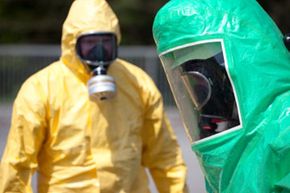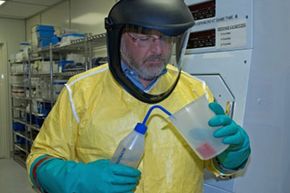Radiation is pretty scary stuff. You usually can't see, smell or taste it, and you can only detect it reliably with special devices that few people have lying around the house. Yet, we constantly hear that radiation causes a wide range of harmful effects, from cancer and sterility to severe burns. One of radiation's more horrifying effects is commonly known as radiation sickness.
Radiation sickness is an umbrella term for the damage caused by a large acute dose of radiation. In fact, the technical term for radiation sickness is acute radiation syndrome. You might also hear it referred to as radiation poisoning. While both acute short-term radiation exposure and long-term radiation exposure can lead to cancer due to DNA damage, cancer caused by radiation is not radiation sickness.
Advertisement
If all this talk of the horrors of radiation has you in a panic, here's something reassuring: Most types of radiation are harmless; even the dangerous kinds won't cause radiation sickness unless you receive a large dose. In fact, any type of emitted energy is basically radiation, like the radio waves picked up by your car stereo, the heat given off by your toaster — even the light given off by the sun. The kind of radiation that causes radiation sickness is called ionizing radiation and includes ultraviolet, X-ray and gamma ray energy. As its name indicates, it's powerful enough to ionizeatoms—that is, to knock some of an atom's electrons away. In fact, extremely high-energy ionizing radiation can even destroy an atom's nucleus.
For most of us, ionizing radiation isn't something we need to worry about on a daily basis. However, sometimes unexpected events can make our fears of radiation sickness seem all too real. We're going to explain exactly how radiation causes radiation sickness, how much radiation will make you sick, and what effects different dosages can have. We'll also find out how radiation sickness is treated and how to prevent it.
Advertisement


